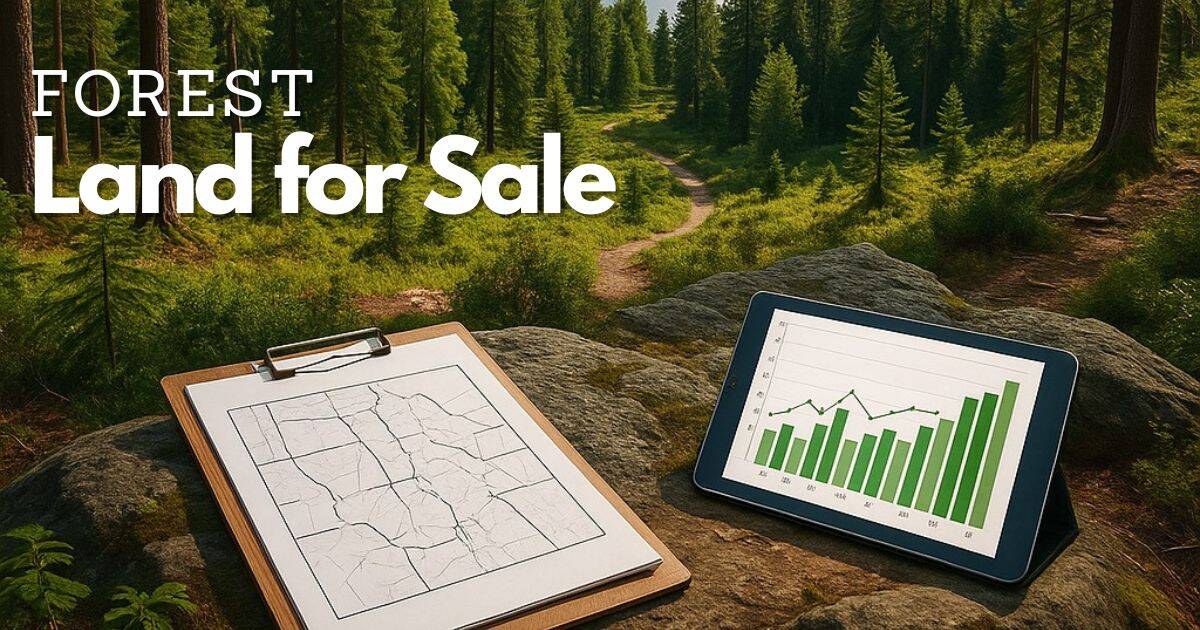Introduction:
Investing in forest land for sale offers a unique opportunity for those looking to diversify their investment portfolio or enjoy a retreat surrounded by nature. Forest land presents a wealth of potential, whether for timber harvesting, carbon credit opportunities, recreational use, or conservation purposes. This article serves as a comprehensive guide, exploring the benefits of owning forest land, what to look for when buying, and key factors that influence its value.
If you are considering purchasing forested land, understanding the different types of land available, the financial opportunities it offers, and the critical considerations for managing and maintaining such a property is essential. By the end of this article, you will have a clear understanding of the advantages and steps involved in buying forested property.
Table of Contents
What is Forest Land and Why is it an Attractive Investment?
Forest land refers to parcels of property covered in forests, often used for various purposes such as timber production, conservation, and recreational activities. The appeal of forest land lies in its natural beauty, diverse wildlife, and potential for long-term financial growth through timber management and environmental incentives like carbon credits.
Investment Potential in Forested Land
The primary value of forest land for sale lies in its ability to generate long-term income through timber harvesting. Timber properties, especially those containing mature pine timber, hardwoods, or coniferous species, offer opportunities for timber sales that can generate significant returns. In addition to timber, forested land can appreciate over time, particularly in areas experiencing urban sprawl or high demand for recreational properties.
A timberland investment also opens the door to carbon credits for forested land, allowing landowners to generate income by preserving forests for their carbon sequestration capabilities. These environmentally friendly benefits make forest properties an attractive option for those interested in sustainable investments.
Environmental and Conservation Benefits
Forest land plays a crucial role in preserving ecosystems, providing habitats for wildlife, maintaining biodiversity, and contributing to water regulation. By purchasing natural forest land for sale, you contribute to the protection of natural resources, making it a wise investment from an ecological standpoint.
Types of Forest Land for Sale
When exploring forest land for sale, it’s essential to understand the different types of properties available, each catering to specific needs and preferences.
Recreational Forest Land
Recreational properties, often located near national forests or other public land areas, are perfect for outdoor enthusiasts. These properties allow landowners to engage in activities like hunting, fishing, hiking, and camping. Recreational forest land is usually more affordable than commercial timberland and offers opportunities for outdoor recreation while maintaining privacy and access to nature.
Timberland for Commercial Use
For those interested in timber as a source of income, timberland is an ideal choice. These properties are specifically purchased for timber production, offering a steady income stream through responsible harvesting practices. Forested land for sale that is already developed for timber harvesting can provide significant financial returns if managed properly.
Carbon Credit Forest Land
In today’s environmentally conscious market, forest owners can participate in carbon credit programs, which allow them to earn financial incentives for conserving forests and mitigating carbon emissions. Many buyers are now looking for carbon credits for forested land for sale to capitalize on the growing demand for eco-friendly investments.
Key Considerations When Purchasing Forest Land
Purchasing forest land involves several key considerations that will influence the success of your investment. Understanding these factors will help you make an informed decision.
Location and Accessibility
The location of your potential forest land for sale is one of the most important aspects to consider. Land for sale bordering national forests or located near recreational areas tends to have higher demand due to its scenic views and privacy. Ensure the land has convenient access for year-round use, and check the roads and utilities available on or near the property.
Timber Quality and Resources
If your goal is to harvest timber, assess the quality of the trees and determine what species are present. Timber resources such as mature hardwoods or pine timber may provide higher returns than younger forests. Consider consulting with a forestry expert to get an accurate valuation of the timber and forecast future growth and harvesting potential.
Zoning and Regulations
Before buying forest land for sale, make sure you understand local zoning laws and land use regulations. Some areas may restrict certain activities, such as residential development or large-scale timber harvesting, so it’s crucial to verify that the land can be used in the way you intend.
Financing Your Forest Land Purchase
Financing forest land for sale is often more complex than purchasing residential property, but there are several options available.
Traditional Financing
Most banks and lenders provide loans for purchasing forest land, though they often require larger down payments due to the unique nature of the investment. Interest rates can vary depending on your financial standing and the property’s potential for generating income.
Seller Financing
In some cases, the seller of forest land for sale may offer financing options. This is often a more flexible arrangement, allowing buyers to bypass the traditional lending process and negotiate terms directly with the seller.
Government Grants and Programs
There are several government programs that offer financial incentives for landowners who engage in sustainable forestry or conservation efforts. Investigating government grants for forest management can provide additional funding opportunities for your purchase.

How to Beat a Possession of Stolen Property Charge: Expert Guide 2025


Property Tax Appeal Attorney: Cut Your Tax Bill by 30%+ (2025 Guide)
Benefits of Owning Forest Land
Owning forest land for sale offers several unique benefits that make it an attractive investment option. Here’s why more people are choosing to invest in wooded properties:
Recreation and Privacy
Forest land offers unparalleled opportunities for outdoor recreation and solitude. Whether you plan to hike through your property, hunt, or enjoy birdwatching, forested properties provide a perfect natural sanctuary. These lands often have easy access to waterways and mountains, increasing their appeal for recreational use.
Income from Timber
As mentioned earlier, timber harvesting is a major source of income from forest land. If you have the proper resources and expertise, managing timber for profit can yield consistent returns over time. You can also engage in sustainable forestry practices to ensure the forest remains healthy and productive for generations to come.
Environmental Conservation
For those passionate about nature conservation, owning forest land allows you to directly contribute to the preservation of natural habitats, wildlife, and ecosystems. By engaging in sustainable land management, you can maintain biodiversity, promote the health of local wildlife, and mitigate environmental threats like climate change.
Popular Forest Land Locations for Sale
Several regions across the United States are known for offering exceptional forest land for sale. Here are some of the top locations for purchasing forested properties:
Pacific Northwest
The Pacific Northwest, including regions like Oregon and Washington, is famous for its vast and diverse forests. Forest land for sale in Oregon offers a combination of scenic beauty and timber resources, making it a prime destination for buyers interested in both recreation and investment.
Southern U.S. States
The southern states like Georgia, Alabama, and Tennessee offer abundant forested areas for sale. These regions are popular for their hardwood forests, excellent wildlife habitats, and opportunities for timber harvesting. The Chattahoochee National Forest is a prime example of a desirable area for timber and recreational properties.
Conclusion: The Value of Forest Land Investment
Investing in forest land for sale presents a unique opportunity for those seeking long-term returns, environmental sustainability, and recreational enjoyment. Whether you are looking to purchase land for timber harvesting, carbon credits, or outdoor recreation, owning forested land offers a wide range of benefits.
By considering important factors like location, timber resources, and sustainable forestry practices, you can maximize the value of your forest property and enjoy both financial and environmental rewards.
FAQs: Frequently Asked Questions
1. Is buying forest land a good investment?
Yes, forest land for sale offers substantial long-term investment potential, particularly through timber sales and environmental incentives such as carbon credits.
2. Can I build a house on forest land?
It depends on local zoning laws. Some areas may restrict residential development, so it’s important to check with local authorities before making a purchase.
3. What are the key factors that determine the investment potential of timberland?
The quality of the timber, the location of the land, access to markets, and sustainable forestry practices all contribute to the investment potential of timberland.




Join The Discussion